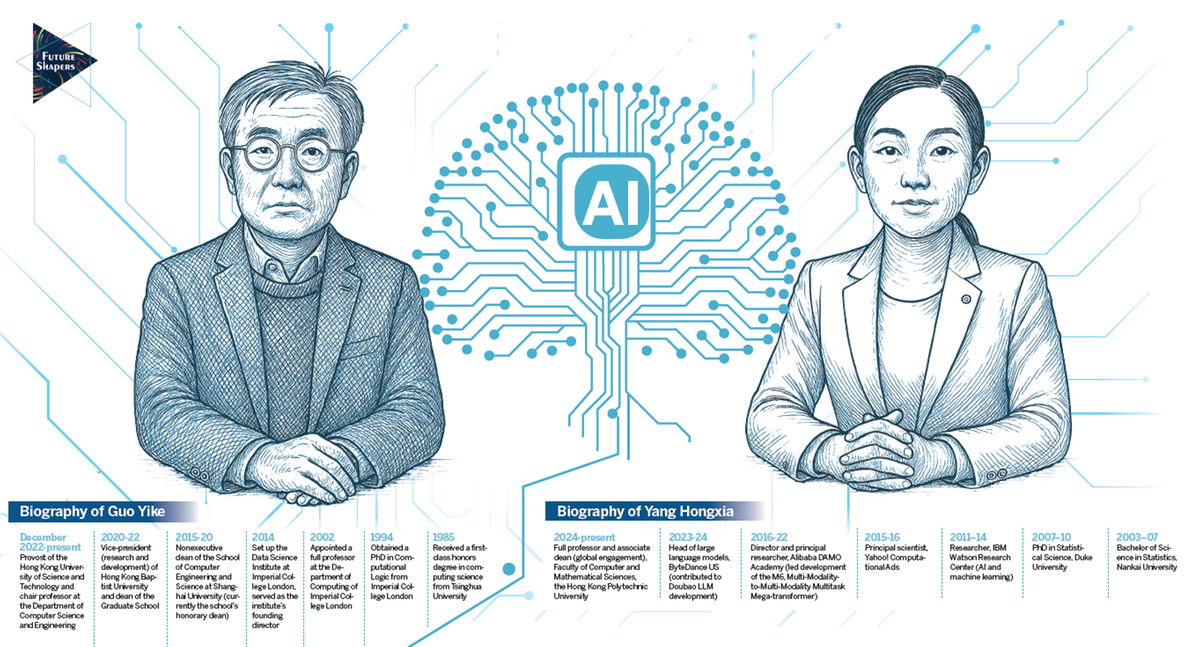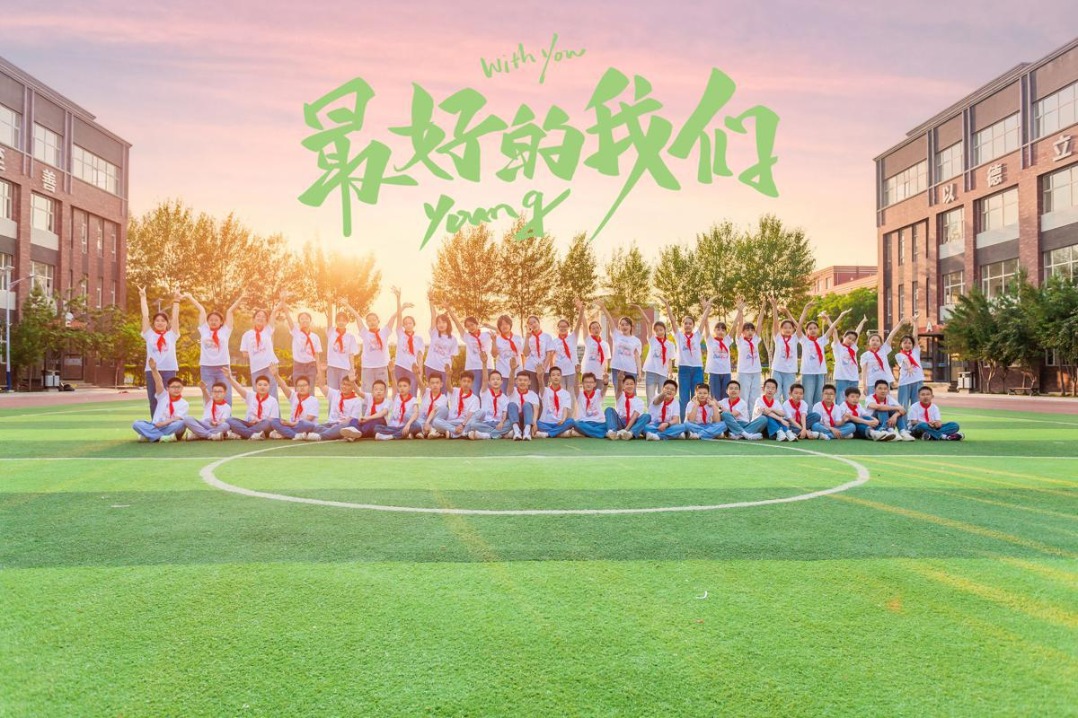Codebreakers of tomorrow
Hong Kong is blessed with the services of two of the world's eminent technology and innovation creators, taking the city to the forefront in the global AI race with milestones in the making.


Editor's note: The engine of progress is powered by those who question the status quo and dare to imagine what comes next. In exclusive interviews, China Daily brings together two pioneering minds — Yang Hongxia and Guo Yike — who have not only witnessed, but actively shaped, the evolution of artificial intelligence.
HK carves out a niche in AI
"Imagine talking to a machine that not only speaks like a human, but also has an unmistakable 'Hong Kong character'. That would be beautiful," says Guo Yike, the visionary behind HKGAI V1 — Hong Kong's first homegrown artificial intelligence large language model.
The model emerged as a red-hot headliner following its public debut in February amid the global AI revolution.
The next major milestone for HKGAI V1? Guo says it's for the model to obtain a good pass in a culture-specific Turing Test.
The Turing Test — named after British computing pioneer Alan Turing — is being commonly used to describe any evaluation to assess a machine's ability to emulate human behavior.
For a Hong Kong LLM to get through a "localized Turing Test", its responses to prompts must be virtually indistinguishable from those of local residents, he says.
Data is key to realizing this vision. Training an LLM involves, in the simplest terms, sampling, analyzing and annotating relevant data before feeding it into the LLM for pattern learning. "What we need is refined data highly reflective of what it means to be a Hong Kong person — something that's distinguishable from other communities," says Guo.
Citing styling recommendations, he explains that when asking HKGAI V1 for advice on fashion, ideal outputs should embody "Hong Kong chic". "The same goes for topics like food, housing, marriage, healthcare and education. When asked for opinions, the model should be able to give answers that reflect the common sense and values of the public within the city," he says.
Local media reports constitute one source of such data, as well as the steady flow of social media content, says Guo, while noting there may be "difficulties" in acquiring certain data despite the ongoing data-sharing collaboration the HKGAI V1's research and development team has with some Hong Kong-based newsrooms.
"There's no easy shortcut for this. Asserting the legitimacy of your data collection and gaining owners' full permission — these are all, rightly, factors to consider before accessing real-world data."
Last year, the Office of the Privacy Commissioner for Personal Data — the city's privacy watchdog — issued Hong Kong's first generative AI-specific personal data protection guidelines for businesses which, among other things, urge developers to minimize the amount of personal data gathered for model training.
To proactively skirt privacy-related issues, Guo says his team is generating synthetic data — datasets created artificially, unconnected to real people — specifically to address HKGAI V1's training needs.
He says HKGAI V1 remains strictly a not-for-profit, public-serving initiative led by the Hong Kong Special Administrative Region government, a position that potentially lends its appeal to all segments of society in contributing high-quality data.
Balanced participation
The model has been piloted in about 70 HKSAR government departments since mid-2024, with the trial's scope continually expanding.
According to Guo, the number of staff involved in the trial run has increased from roughly 1,000 in February to around 20,000 as of early June.
Upgrades based on the feedback have been introduced monthly, with the latest iteration focused on enhancing the model's abilities to digest and recommend academic papers, generate graphic and table content, and support more personalized material creation.
Guo says he appreciates the government taking the lead in Hong Kong's AI development, adding that such an approach is "the best, most cost-effective, most goal-oriented, and fastest" path to fulfilling the city's technology-driven ambitions.
"In this case, 'government-led' means much more than the government just injecting funding into R&D centers," he says. "The cleverest part of all these is that the government took the initiative to be the first mover as a trial user."
The government has extensive, yet well-defined application scenarios, covering various realms — from legal affairs, finance and environmental protection to education and other fields — that minimize the risk of aimlessly fumbling in the dark, Guo explains.
If R&D centers were to operate independently, their emphasis on academic achievements may downplay practical improvements to the user experience.
Governmental oversight also ensures that the feedback received for upgrades is not heavily swayed by market interests and profit-seeking motives that would present a challenge if leading corporations were to dominate the development landscape, says Guo.
However, the tech guru recognizes the team's expanding needs for computing capacity for the model's further evolution. "The demand is essentially distilled into two things — the amount of computing power available, and how much money is needed to purchase it."
In his view, financial input from the private sector could significantly expedite the model's ultimate opening up to public use.
A HK$200 million ($25.6 million) donation from the Ng Teng Fong Charitable Foundation and property developer Sino Group in March to the Hong Kong Generative AI Research and Development Center — the institution behind the HKGAI V1's R&D team — marked the first of such private sector support, primarily aimed at providing computing power and manpower for an HKGAI V1-powered mobile application to residents.
In the long run, Guo is sanguine about Hong Kong-based entrepreneurs capitalizing on commercial opportunities to develop innovative, industry-specific applications after the HKGAI LLM evolves into a full-fledged foundational model for such initiatives.
'A hundred flowers in bloom'
Guo, an avid art buff, cites the first project he spearheaded in Hong Kong in 2022 — an innovative art-tech trio comprising an AI choir, media artist and dancers — as a compelling demonstration of AI's creative potential and the exciting prospects of AI-empowered arts, culture and creative industries.
"One of the vertical applications of HKGAI V1 now being tested for the transcription of minutes of meetings was developed from the voice recognition technology originally devised for the AI choir," he says.
Hong Kong's frontier industry insiders should have confidence in the city's chosen path toward establishing itself as a world-leading AI center.
He argues that the notion of a singular "best development route" is a fallacy that fuels an untenable discussion of regional and global AI rivalries. Instead, AI prosperity is a scene with "a hundred flowers in bloom", watered by diversity, openness and collective progress.
Guo considers his team, along with the developers at DeepSeek — a Hangzhou-based AI startup whose data learning model laid the groundwork for HKGAI V1 — as epitomizing the synergistic nature of AI development.
"Technical communication between us has been frequently initiated," he says, adding that, on a broader level, exchanges between the HKSAR and the Chinese mainland in the AI realm have been gaining sustained traction long before HKGAI V1 entered the picture, primarily through cross-border talent interflow.
Guo, the provost of the Hong Kong University of Science and Technology, takes pride in the critical involvement of the school's doctoral graduates in DeepSeek's development of low-cost, open-source LLMs, an achievement that jolted the global tech community earlier this year.
In recent years, an average of 90 percent of HKUST's PhD students are from the mainland, with many playing mainstay roles in leading businesses and research institutions across the country after graduation.
When asked whether his relatively recent arrival in Hong Kong poses cultural or language barriers to his ambition to install his brainchild with "a genuine Hong Kong character", Guo's answer is emphatic: "None whatsoever."
"For us technicians and scientists, it's always about technical advancement. What I do is to swim with the irreversible tide of our times while being self-driven by a common desire shared among peers to nudge higher."




































